|
|
|
Sort Order |
|
|
|
Items / Page
|
|
|
|
|
|
|
| Srl | Item |
| 1 |
ID:
089937
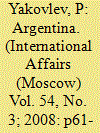

|
|
|
|
|
| Publication |
2008.
|
| Summary/Abstract |
That was not the first time in its almost 200-year history that the Argentine Republic abruptly altered the vector of its development. The previous period of structural reform was in the 1990s, passing under the sign of neoliberalism. Over a number of years, the country served as an example of a "successful" transplantation of the principles of market fundamentalism and monetarism to Latin American soil, while the chief Argentine neoliberal - Economy Minister Domingo Cavallo - became Wall Street's favorite, according to the US media. The monetarist experiment in Argentina ended in a deep economic and sociopolitical crisis of 2001-02, which highlighted the pressing need for a change in the national development paradigm.
|
|
|
|
|
|
|
|
|
|
|
|
|
|
|
|
| 2 |
ID:
089936
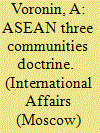

|
|
|
|
|
| Publication |
2008.
|
| Summary/Abstract |
ASEAN's political elites agree that no one nation in the world, however, strong, can cope on its own with the formidable and ever growing transnational problems. There should be therefore as much as possible collective efforts to put in place a powerful regional community in the shortest space of time. This is the only way to harness globalization's advantages, hold out and achieve the development rate appropriate under global competition.
|
|
|
|
|
|
|
|
|
|
|
|
|
|
|
|
| 3 |
ID:
089993
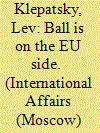

|
|
|
|
|
| Publication |
2008.
|
| Summary/Abstract |
Relations with the European Union are one of Russia's foreign policy priorities. Today when the Partnership and Cooperation Agreement (PCA) has expired the sides should decide what to do next. The question is: Does the accumulated experience of many years of cooperation allow the sides to transform their relations into partnership or even strategic partnership, which calls for confidential and sustainable relations and respect for the sides' interests? Here are other no less important questions that totally belong to the EU competence: first, to which extent can the European Union be described as a subject of world politics and which is its international personality? Second: Can an integration structure of 27 members with their inevitably different interests be engaged in strategic partnership in the foreign policy sphere? In my previous article "The European Union: Shortsighted Strategy" (that appeared in International Affairs in 2007) I expressed my doubts about the European Union's legal and political competence in this sphere.
|
|
|
|
|
|
|
|
|
|
|
|
|
|
|
|
| 4 |
ID:
089964
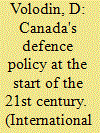

|
|
|
|
|
| Publication |
2008.
|
| Summary/Abstract |
The start of this century was marked by an objective need to review Canada's defense policy. The 9/11 events were a catalyst in that process. Taking into account the colossal interdependence that existed between Canada and its southern neighbor in all spheres, it was obvious that the terrorist attack on the United States would have a profound impact on all aspects of Canada's life, including its defense and security policies.
|
|
|
|
|
|
|
|
|
|
|
|
|
|
|
|
| 5 |
ID:
089934
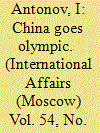

|
|
|
|
|
| Publication |
2008.
|
| Summary/Abstract |
China entered the race for hosting the Summer Games in 2008 in earnest. At stake was the prestige of a country which, by the start of this century, entered the stage of a rapid economic development, growing political influence in the region and full participation in international affairs. Some called on numerology, rather respected in China, for help. According to the original plans, the Olympics were to be held between July 25 and August 10, but the IOC meeting in Prague ruled that the opening date should be August 8 because Beijing is known for intense heat and humidity in late July and early August. "Eight" is the most positive and happy number in Chinese tradition
|
|
|
|
|
|
|
|
|
|
|
|
|
|
|
|
| 6 |
ID:
089940
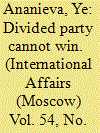

|
|
|
|
|
| Publication |
2009.
|
| Summary/Abstract |
The shifts in the social and demographic descriptions of the suburbs, the growing number of exurbs (commuter-towns with fairly high living standards) and more intensive southward migration are the main factors. The same can be said of the very apparent desire of people with similar social and economic statuses, life styles and political preferences live in neighborhood communities. In this way constituencies are growing politically polarized. Mutual influences inevitable in the uniform social milieus (that have practically no contacts with groups of different ideological and political preferences) push them to extremes far removed from the political middle-of-the-road. Under George W. Bush polarization grew noticeable to the extent that people joked that the Republican and Democratic states could function as independent countries.
|
|
|
|
|
|
|
|
|
|
|
|
|
|
|
|
| 7 |
ID:
089968


|
|
|
|
|
| Publication |
2008.
|
| Summary/Abstract |
Perestroika was into its fourth year. Needless to say, that process could not have possibly bypassed the Foreign Ministry. Especially taking into account the fact that one of the masterminds of new political thinking held the ministerial seat. Calls to promote criticism and self-criticism, and openness and debate were coming from everywhere. No sanction from above was any longer required to bring any of the "for official use only" topics out into the open. All of that inspired the authors, rank and file officers at the Foreign Ministry at the time, to take up the pen. It was not our intention to go too deep into analyzing the new trends of Soviet foreign policy. The goal was far more modest - i.e., to tell, from the average person's perspective, about the way in which life at the ministry was organized, as well as about the problems and concerns that had affected the "diplomatic guard" during the perestroika era.
|
|
|
|
|
|
|
|
|
|
|
|
|
|
|
|
| 8 |
ID:
089966


|
|
|
|
|
| Publication |
2008.
|
| Summary/Abstract |
Question one about whether Gazprom is a reliable partner seems to me easier to answer, so I'll start with it. Let's compare the results of two recent polls. One was carried out in January-February 2008 for the British Financial Times by Harris Service in Western Europe and the USA. The other one was conducted by the organizers of the FLAME conference in Amsterdam on March 4, 2008 among 700 heads of European energy companies. These polls produced diametrically opposite results
|
|
|
|
|
|
|
|
|
|
|
|
|
|
|
|
| 9 |
ID:
089997


|
|
|
|
|
| Publication |
2008.
|
| Summary/Abstract |
One of the key events in a historic turning point that changed the appearance of the modern world was the opening of several checkpoints in the Berlin Wall in the evening hours of November 9, 1989. It went down in history of Germany, Europe and the whole of mankind as one of the main episodes that clinched the epoch of confrontation. As Minister-Counselor of the USSR Embassy in the GDR, I had a good chance to watch how the situation developed from close quarters. To quote the Iron Chancellor, Otto von Bismarck, the train of History's cloak rustled within reach.
|
|
|
|
|
|
|
|
|
|
|
|
|
|
|
|
| 10 |
ID:
089931
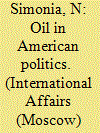

|
|
|
|
|
| Publication |
2008.
|
| Summary/Abstract |
Gradual consolidation at the domestic oil front allowed the American oil producers to ship their product in large quantities to Europe living through its industrial revolution. In 1870s and 1880s, America exported the larger part of the locally produced kerosene to Europe and Russia, two largest markets at that time.
|
|
|
|
|
|
|
|
|
|
|
|
|
|
|
|
| 11 |
ID:
090002


|
|
|
|
|
| Publication |
2008.
|
| Summary/Abstract |
Corresponding member of Russian Academy of Sciences A. V. Tokunov justly observes in his introduction that this is the first attempt made in Russia and elesewhere to outline the foundations of an interdisciplinary approach to the system of international relations, practical psychology for diplomats probing at the social and psychological aspects of diplomatic activities at the junction between history and theory of international relations, diplomatic and consular services, social psychology and study of culture.
|
|
|
|
|
|
|
|
|
|
|
|
|
|
|
|
| 12 |
ID:
089938


|
|
|
|
|
| Publication |
2008.
|
| Summary/Abstract |
THE ELECTION RACE to choose the 44th president of the United States is in full swing, attracting increasing attention both in the US and outside. Having broken all records in campaign spending, the ongoing presidential race remains unpredictable, keeping the US electorate and political establishment in suspense.
|
|
|
|
|
|
|
|
|
|
|
|
|
|
|
|
| 13 |
ID:
090000


|
|
|
|
|
| Publication |
2008.
|
| Summary/Abstract |
Russia is rediscovering Japan. However, despite the Japanese craze, Russians are poorly informed about Japanese history, politics, and culture. As far as Japanese political figures are concerned, there are hardly 10 people out of 1000 who would be ablt to name the Japanese head of government. Needless to say, it is not difficult to find an excuse for that. Japanese
|
|
|
|
|
|
|
|
|
|
|
|
|
|
|
|
| 14 |
ID:
089994


|
|
|
|
|
| Publication |
2008.
|
| Summary/Abstract |
Two countries, two huge terrotories spanning vast expanses and incorporating a substantial part of the Arctic Ocean and the arctic region. There are probably no two other large states in the world with such a natural and geographic diversity and at the same time so similar as Russia and Canada. Incidentally, today the similarity between them is not only natural (geographic), but also social. The two multiethnic and multi-confessional societies today have largely similar problems. The goal of "continuing steady and stable development, based on the systematic work to meet social guidelines," which was formulated by RF First Deputy Prime Minister Dmitry Medvedev, is also relevant for Canada. All political parties in Canada without exception regard healthcare, education, housing, etc. as strategic priorities. Not surprisingly, Canada has become to a new Russia one of the most substantial (and responsive) sources of experience in state and nation building.
|
|
|
|
|
|
|
|
|
|
|
|
|
|
|
|
| 15 |
ID:
089932


|
|
|
|
|
| Publication |
2008.
|
| Summary/Abstract |
The parliamentary cooperation between Russia and the EU is not only a tribute to parliamentarism, its growing role in the world (See: United Nations Millennium Declaration of September 8, 2000), and democracy as the ideology of the early 21st century, which is really important in itself. Its diplomatic and international legal dimension is of no less importance either.
|
|
|
|
|
|
|
|
|
|
|
|
|
|
|
|
| 16 |
ID:
089995


|
|
|
|
|
| Publication |
2008.
|
| Summary/Abstract |
The current phase in the Russia-Tajikistan cooperation opened with President Putin's official visit to Dushanbe (Oct. 2004) and it is characterized by an extremely high intensity of contacts. In the years that followed, the two leaders, Vladimir Putin and Emomali Rahmon, met more than once. There are regular contacts between members of the two governments and parliaments and intergovernmental associations. Many current problems are being solved at interdepartmental and interregional levels.
|
|
|
|
|
|
|
|
|
|
|
|
|
|
|
|
| 17 |
ID:
089928
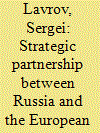

|
|
|
|
|
| Publication |
2008.
|
| Summary/Abstract |
Russia is consistently strengthening its stand as a donor-country in international development assistance. Within the framework of the Paris Club we've reduced the debt burden of developing countries by approximately 12 billion dollars. Within the context of G-8 Russia undertook additional obligations to finance over the coming 4 to 5 years various initiatives in such areas, as education, control of infectious diseases and eradication of energy poverty, totaling about $600 million. In 2007 we provided $210 million for the development assistance, and that does not include debt write-offs. As domestic social and economic conditions improve we will be increasing this figure gradually in compliance with the UN recommendations.
|
|
|
|
|
|
|
|
|
|
|
|
|
|
|
|
| 18 |
ID:
089930


|
|
|
|
|
| Publication |
2008.
|
| Summary/Abstract |
Mankind has no other acceptable alternative but to ensure security collectively, through working together. This task is too tough, both in financial and military terms, for a single State or any narrow coalition to tackle. The very logic behind the evolution of present-day international relations proves futility of unilateral and bloc-based schemes, particularly force-oriented ones. Their champions are incapable of guaranteeing security even for themselves and only show the limits of what such a response can achieve. But the main thing is that such actions undermine stability by forcing other countries to take care of their security on their own. And this, as a rule, does damage to non-proliferation.
|
|
|
|
|
|
|
|
|
|
|
|
|
|
|
|
| 19 |
ID:
089974


|
|
|
|
|
| Publication |
2008.
|
| Summary/Abstract |
Civilization (cultures) in their empirical reality are represented by multitudes of people, their alliances and communites. There is the question: who personifies any given civilization, who has the uncontested right or at least preference to represent civilization and speak in its name? There are no such individual or no such group because civilization is not merely a sum-total of people- it is a sum-total of very different people
|
|
|
|
|
|
|
|
|
|
|
|
|
|
|
|
| 20 |
ID:
089941


|
|
|
|
|
| Publication |
2009.
|
| Summary/Abstract |
It is commonly believed in Russia that the history of its ties with the South Slavic nations was limited to its contacts with Serbia and Montenegro. This is not true: from the very beginning Russians maintained contacts with all Slavic nations. The national movements in the Balkans were not alien to capitalizing on Russia's authority and strength to pursue their own, frequently contradictory, interests. All of them, however, were dead set against Russia's greater role in, let alone domination, over the Balkans. The conflicts stirred up by Serbia and Bulgaria with Russia after the latter's liberatory mission in the Russo-Turkish war serve an ample illustration of how the Southern Slavs treated Russia, its efforts and its sacrifices for their sake. Fedor Dostoyevsky left us the most apt comment: "I am convinced, and this is the fullest and the strongest of my convictions, that Russia will have, and have not yet had, more bitter and envious
|
|
|
|
|
|
|
|
|
|
|
|
|
|
|
|
|
|
|
|
|